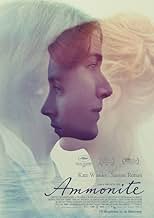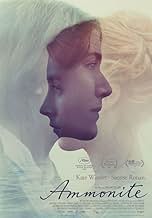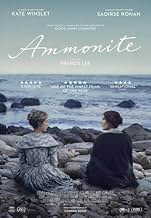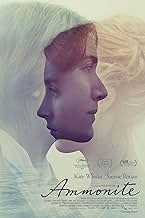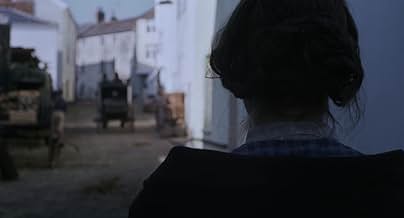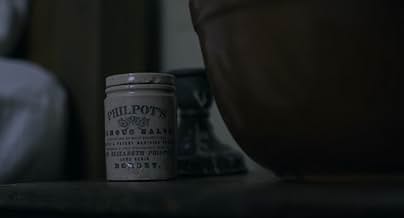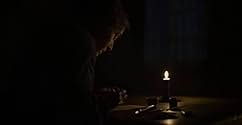Dans les années 1840, en Angleterre, la célèbre chasseuse de fossiles Mary Anning et une jeune femme développent une relation intense qui changera leur vie à jamais.Dans les années 1840, en Angleterre, la célèbre chasseuse de fossiles Mary Anning et une jeune femme développent une relation intense qui changera leur vie à jamais.Dans les années 1840, en Angleterre, la célèbre chasseuse de fossiles Mary Anning et une jeune femme développent une relation intense qui changera leur vie à jamais.
- Nominé pour le prix 1 BAFTA Award
- 3 victoires et 33 nominations au total
Victoria Elliott
- Three Cups' Maid
- (as Victoria Elliot)
Robert Purdy
- Party Guest
- (as Robert J. Purdy)
Histoire
Le saviez-vous
- AnecdotesSaoirse Ronan's favourite film growing up was Titanic (1997), so she was overjoyed to not only act in a film with Kate Winslet, but to also play her lover. Ronan said to Winslet when filming: "Who would have thought, when I was eight years old, that I'd be kissing Rose one day!"
- GaffesCharlotte is portrayed as younger than Mary, with Kate Winslet being almost twenty years older than Saoirse Ronan. In reality, Charlotte was a decade older than Mary.
- Citations
Elizabeth Philpot: You know you can always ask me for help.
- ConnexionsFeatured in Projector @ LFF: Ammonite (2020)
- Bandes originalesGesellschafts - Walzer, Op. 5
Composed by Johann Strauss Sr. (as Johann Strauss Snr.)
Arranged by John Mortimer
Performed by David Juritz, Ben Hancox and James Boyd
Commentaire en vedette
I put this film in the genre of Lesbian Twaddle - I can say that as I am one. I'm not sure who these films are aimed at, but that is beside the point. My main problem with this film is the misogyny and it is a big problem. Very rarely does a film make me cross, but this one did. It also makes me cross that I have only found one review that picks up on this issue. It's on a website called Paste if anyone wants to look it up. Many people question, why make up a lesbian romance for Mary Anning when there is no evidence for one, but no-one questions the misogynistic approach. I personally don't have a problem with the lesbian bit -we have been written out of history.
The initial premise of the film and main focus of the first half hour or so, it to highlight the misogyny of the scientific establishment at the time and Mr Murchison's treatment of his wife. The ultimate irony is that, Francis Lee by his portrayal of Charlotte Murchison and Elizabeth Philpot (Fiona Shaw), does both these women a great dis-service. Charlotte is portrayed as vapid and Elizabeth as some old hippy type making herbal remedies, when they were both accomplished scientists in their own right and had interesting lives. The film is misogynistic because it gives less attribution to their paleontology achievements than did the male-dominated natural history circles at the time!
Unless Francis Lee simply wants to maintain his position as prime director of LGBT films (I thought God's Own Country was excellent), I don't know why he felt the need, when Mary Anning had a very eventful life which would have made a much better film, to create a mythical lesbian romance. He would have done just as well to base a film on her brother Joseph. Rich man from London turns up in Lyme Regis with his errant son, leaves him with Joseph because he thinks a bit of sea air and hard work in the upholstery trade will turn his life around. A bit of drudgery with horsehair and cotton wadding, then sex on a pebbly beach - job done!
I gave the film six stars because it was well acted and the cinematography and costumes were excellent. However two last points that I think were huge gaffs. No-one in 1840 and who kept their own chickens would cook an addled egg or one with a chick in (it happened so fast I couldn't quite see) as eggs would be collected every day and you know if a hen has gone broody is sitting on eggs. Gone off eggs float when put in a bowl of water. Also I'm sure men did not tie their scarves in a Hoxton knot in 19th Century England - maybe on the continent but not here!
The initial premise of the film and main focus of the first half hour or so, it to highlight the misogyny of the scientific establishment at the time and Mr Murchison's treatment of his wife. The ultimate irony is that, Francis Lee by his portrayal of Charlotte Murchison and Elizabeth Philpot (Fiona Shaw), does both these women a great dis-service. Charlotte is portrayed as vapid and Elizabeth as some old hippy type making herbal remedies, when they were both accomplished scientists in their own right and had interesting lives. The film is misogynistic because it gives less attribution to their paleontology achievements than did the male-dominated natural history circles at the time!
Unless Francis Lee simply wants to maintain his position as prime director of LGBT films (I thought God's Own Country was excellent), I don't know why he felt the need, when Mary Anning had a very eventful life which would have made a much better film, to create a mythical lesbian romance. He would have done just as well to base a film on her brother Joseph. Rich man from London turns up in Lyme Regis with his errant son, leaves him with Joseph because he thinks a bit of sea air and hard work in the upholstery trade will turn his life around. A bit of drudgery with horsehair and cotton wadding, then sex on a pebbly beach - job done!
I gave the film six stars because it was well acted and the cinematography and costumes were excellent. However two last points that I think were huge gaffs. No-one in 1840 and who kept their own chickens would cook an addled egg or one with a chick in (it happened so fast I couldn't quite see) as eggs would be collected every day and you know if a hen has gone broody is sitting on eggs. Gone off eggs float when put in a bowl of water. Also I'm sure men did not tie their scarves in a Hoxton knot in 19th Century England - maybe on the continent but not here!
- chrisarciszewska
- 28 mars 2021
- Lien permanent
Meilleurs choix
Connectez-vous pour évaluer et surveiller les recommandations personnalisées
Détails
Box-office
- Budget
- 10 000 000 £ (estimation)
- Brut – États-Unis et Canada
- 160 930 $ US
- Fin de semaine d'ouverture – États-Unis et Canada
- 87 552 $ US
- 15 nov. 2020
- Brut – à l'échelle mondiale
- 1 109 287 $ US
- Durée1 heure 57 minutes
- Couleur
- Rapport de forme
- 1.85 : 1
Contribuer à cette page
Suggérer une modification ou ajouter du contenu manquant








